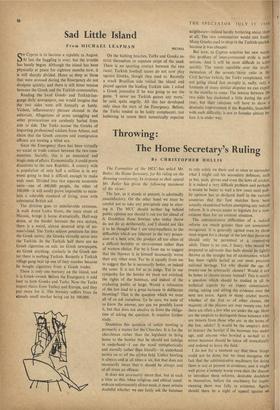Sad Little Island
From MICHAEL LEAPMAN
NICOSIA
o Cyprus is to become a republic in August. a At last the haggling is over; but the trouble has barely begun. Although the island has been physically at peace for eighteen months now, it is still sharply divided. Hates as deep as those that were aroused during the Emergency do not dissipate quickly, and there is still bitter tension between the Greek and the Turkish communities.
Reading the local Greek- and Turkish-lan- guage daily newspapers, one would imagine that the two sides were still formally at battle. Violent, inflammatory phrases abound in the editorials. Allegations of arms smuggling and other provocations are carelessly hurled from side to side. The Turks accuse the Greeks of importing professional soldiers from Athens, and claim that the Greek customs and immigration officers arc turning a blind eye.
Since the Emergency there has been virtually no social or trade contact between the two com- munities. Socially, this is an unnatural and tragic state of affairs. Economically, it could prove disastrous to the new Republic. A country with a population of only half a million is in any event going to find it difficult enough to make ends meet. Divided into two separate economic units—one of 400,000 people, the other of 100,000—it will surely prove impossible to main- tain a tolerable standard of living, even with substantial British aid.
The division goes to unbelievable extremes. A walk down Ledra Street, the main street of Nicosia, brings it home dramatically. Half-way down, at the border between the two sectors, there is a weird, almost deserted strip of no- man's-land. The Turks seldom penetrate far into the Greek sector; the Greeks virtually never into the Turkish. In the Turkish half there are no Greek cigarettes on sale, no Greek newspapers, no Greek anything; similarly in the Greek sec- tor there is nothing Turkish. Recently a Turkish village gang beat up one of their number because he bought cigarettes from a Greek trader.
There is only one brewery on the island, and it is Greek-owned. Before the Emergency it sold beer to both Greeks and Turks. Now the Turks import theirs from Turkey and Europe, and they pay more for it. The brewery suffers from its already small market being cut by 100,000. On the bathing beaches, Turks and Greeks re- strict themselves to separate strips of the sand. There is no sporting contact between the two races; Turkish football teams do not now play against Greeks, though they used to. Recently a crack Brazilian side visited the island and played against the leading Turkish side. I asked a Greek journalist if he was going to see the game. 'I never see Turkish games any more,' he said, quite angrily. All this has developed only since the start of the Emergency. Before, the Turks tended to be lazily complacent, not bothering to resent their numerically superior neighbours—indeed hardly bothering about thel at all. The two communities would mix freelY. Many Greeks used to shop in the Turkish market, because it was cheaper.
But now, as Cyprus acquires her new statu this problem of inter-communal strife is mo serious. And it will be most difficult to sob quickly. The recent squabble over the imp) mentation of the seventy/thirty ratio in t Civil Service (which, the Turks complained, W not going ahead fast enough) is, sadly, only foretaste of many similar disputes we can expe in the months to come. The tension between ti two sides has slackened a little during the pa year; but their relations will have to show dramatic improvement if the Republic, launch( with such difficulty, is not to founder almost fore it is under way. st
•
a ct st a be-






































 Previous page
Previous page